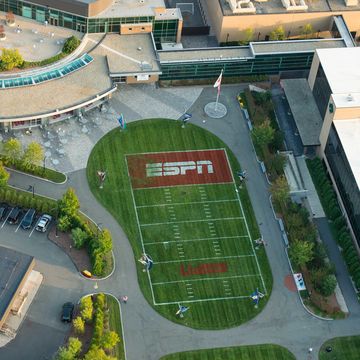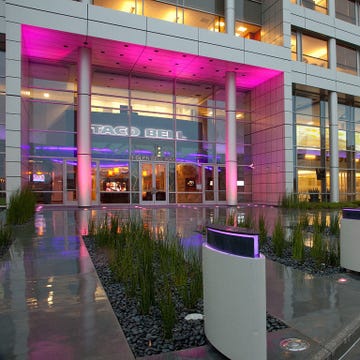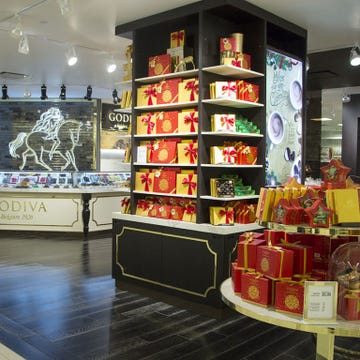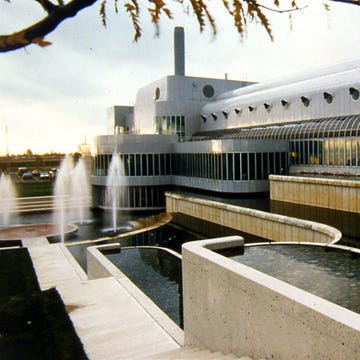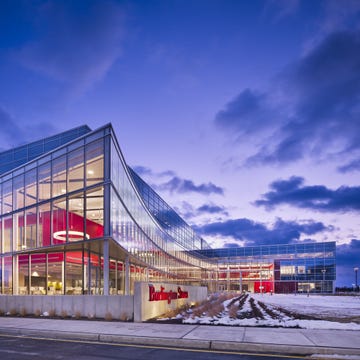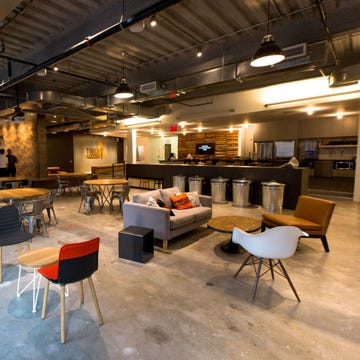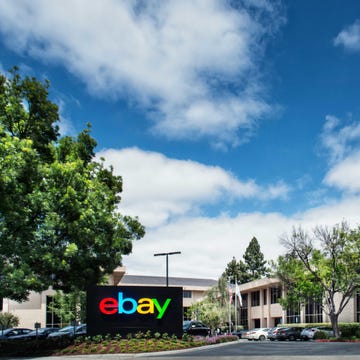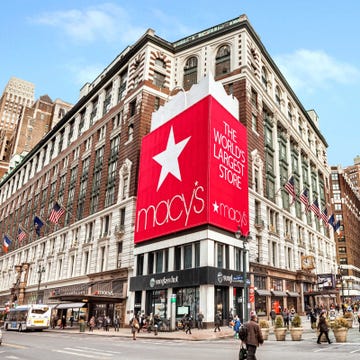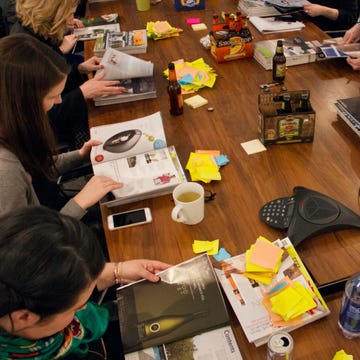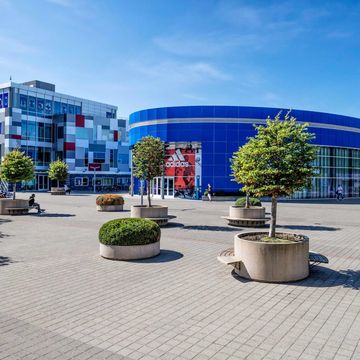The baristas who make your morning latte may be the face of Starbucks, but the corporation is looking for employees from just about every career discipline. Store designer, architect, real estate agent, contractor, programmer, communications specialist, financial expert, lawyer, advertising executive, sales associate, baker, and coffee roaster are just a few of the job descriptions held by the 135,000 U.S. Starbucks employees, all of whom are called "partners" to evoke a culture of inclusion.
The company is always hiring, and it has made a concerted effort to attract Millennials, which represent 80 percent of its workforce, according to retail recruiting manager Melissa Lang. "Millennials are our future. They are forward-thinking, technologically savvy, and deeply vested in their desire for purpose and meaning in their work, contributing to something larger," Lang says. "We see Millennials as our future thought leaders."
Starbucks has several initiatives that make working there in your 20s particularly attractive: paid internships, diversity programs that actively recruit people of all backgrounds and, namely, its College Achievement Plan. In June, the company announced that it will offer full tuition reimbursement for qualified employees who complete an online bachelor's degree through Arizona State University. Lang describes how to join the company.
What specific qualities do you look for in every candidate?
Every candidate has to have a genuine desire for connection to the company and their community. You're also going to need some aptitude to drive results. Whether it's increasing revenue as a store manager, coming up with a new business idea, or pitching a partner-improvement idea, we're always looking for the next great leader to bring something to the table. And it needs to be bold.
Do you have an example of an employee bringing a bold idea to the table?
Our CUP Fund for Partners was an idea that came from four partners working together in a store. They saw one of their coworkers needed financial assistance, and they pitched the fund idea. It acts as a safety net for partners by providing monetary help following natural disasters or family emergencies. Since 1997, the fund has provided $14 million in grants to more than 12,500 partners in need.
What do you expect candidates to know about the company before an interview?
There's definitely preparation that needs to be done. Everyone needs to come in with questions specific to the business of Starbucks. You don't need to know every coffee, but you should know what we're promoting right now. Be aware of our business news and demonstrate that you've made an investment in getting to know more about the company. An easy way to do this is to visit a store, look around, and ask a lot of questions.
What if a candidate doesn't drink coffee — is this a deal-breaker?
We have plenty of partners who don't drink coffee. You can drink tea or nothing at all. But I would say it's really important to have an appreciation for coffee. Understanding how coffee influences the world and how Starbucks contributes to that impact is critical to what we do. So many people connect over coffee and tea every day. Many of our interviews start with a coffee tasting so that we can share a moment of connection with each candidate before we get down to the specifics of the job.
How often do you hire new people?
Every day. Probably something like one person an hour.
What are the most readily available jobs?
There is a wide range of opportunities in our stores in the U.S. Retail positions offer the most diversity of opportunity. Those can range from baristas to store managers to district managers, regional directors, and there are a lot of different field roles, which support the stores. Some of those roles are construction managers, facility service managers, business partners, communications, and so on. In the Starbucks Support Center, our corporate headquarters in Seattle, we hire for roles in finance, accounting, human resources, store development and design, IT, and management.
Where are most jobs located?
We have 12,973 retail stores across the U.S., which provides people with a great opportunity to start their careers close to home or anywhere they want to be. We also have regional offices in 15 major cities, including Chicago, New York, Denver, and San Francisco.
Does each regional office have a specific hiring focus?
Each region fills the same types of jobs, but what we look for is local talent. For example, we look for store designers and architects from the area so they can bring relevant aesthetics. We want retail employees who live in the area so they can speak the language of the culture. It ties back to our desire to be a part of each community.
What's the likelihood of a coffeehouse job turning into a higher-level job at the company?
About 70 percent of our employees are promoted within the company. If you start in retail, you don't have to stop there. I just spoke to a partner who was a store manager and has an interest in recruiting. She moved from a regional store to the corporate office in Seattle and is now in a recruiting coordinator position, which is the first step for that career path.
Do you require degrees specific to each job?
Our requirements vary depending on the job. But we really look for partners with diverse backgrounds, including diversity in experience and education. A partner who starts in retail without a degree in a field of their interest can train on the job here to acquire those skills as well as take advantage of our College Achievement Plan to finish their degree. If you're always following the same model, always looking in the same pool of candidates, you're not going to get that creativity and diversity in your employees.
Where do you most regularly look for candidates?
Our best resources are partner referrals and our Starbucks Career Page. Our partners make so many meaningful connections every day. It's natural to identify candidates this way. We also use LinkedIn to identify and recruit candidates.
Do you attend trade shows, job fairs, or other public events where candidates might have a chance to network with you?
We are very active on college campuses, and we host regional career fairs all the time. We announce all of this on our Twitter devoted to job opportunities. We also do very targeted recruiting for veterans and spouses of active military. We have a goal to hire 10,000 veterans and spouses across the company over the next five years. So far, we have made significant progress by hiring a dedicated military recruiter and increasing our presence at military job fairs representing the various branches and others sponsored by Hiring America's Heroes and the USO/Hire Heroes USA. We also attend military spouse hiring fairs. Hiring is just the first step. We are also focused on retention because we are viewing this as something that will benefit our company over the long term.
Do you have a paid internship program?
We have an annual internship program for college students that hosts about 50 interns in our Seattle office. This year, interns worked in 11 different business units including global operations, partner resources, and finance. Interns are paid a competitive salary. Pay varies based on the internship position, and we adjust housing and relocation costs depending on the distance an applicant needs to travel to relocate. We work with each intern to accommodate his or her needs. On average, about 75 percent of our interns turn into full-time hires.
What types of questions do you typically ask in an interview?
We always like to explore, "Why Starbucks?" It's not a test. It actually helps us understand how we connect with the community. I'm always going to ask for very specific examples of your failures because I want you to know them. We always know our strengths — at least I hope we do — but I want people who are self-aware enough to talk about their past mistakes and reflect upon them.
What questions should candidates always ask in an interview?
Ask questions about the values of the specific team you're hoping to work for. For example, "What qualities do you value in your top performers?" If there's a bullet point on the application that really piques your curiosity, dig deeper and ask about it. Be able to articulate your strengths and be authentic.
What questions turn you off in an interview?
You'd be surprised how many candidates end an interview with, "So, did I get the job?" Understand when you're in an interview, you're in an interview from beginning to end. And the question about salary is something that should be addressed, so don't hesitate to ask about it. But ask at the appropriate moment. Allow our team to lead those talks.
What's a mistake people make in interviews all the time and don't know it?
Showing up unprepared without a copy of your résumé, without understanding your own strengths, without knowing about Starbucks. Body language is incredibly important when interviewing in person. Show enthusiasm. Make eye contact. It's very basic. It's important to be engaging in a phone interview as well. We can tell if you're texting during the interview.
Do you value thank-you notes?
Send a thank-you note if you have something relevant to say. Maybe you want to elaborate on something that was discussed in the interview. Maybe you connected with the recruiter on something personal. If you have something to say that will really make us think about you, put that in a thank-you note. But if you are considering sending a standard, form-letter thank you, don't do it.
Is there any kind of test during the application process?
We have something called the Virtual Job Tryout, which is a list of scenarios you might encounter in a job such as store manager or district manager. It's all done online, and it gives us a sense of how you would do the job.
What is your preferred interview dress code?
The culture is very casual and eclectic. You see everything from business casual to inspiring, artsy-type outfits. Always lean a little more toward business casual when going into an interview. If you're looking in the mirror and you're not sure, it's probably not right.
Interview Insider is weekly series offering tips for getting a job at some of your favorite companies. Check back every Thursday for the latest interview.
Follow Heather on Twitter.



